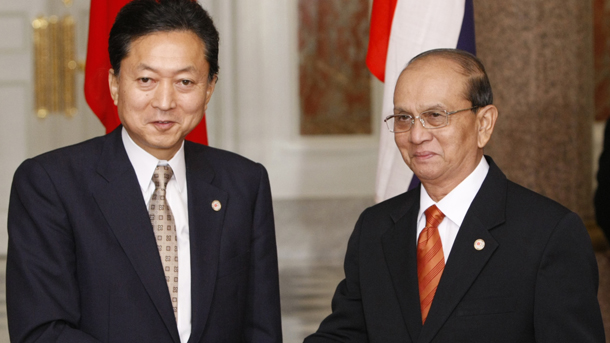Burmese President Thein Sein arrived in Japan on Friday to further enhance the military-dominated nation’s renaissance on the world stage and negotiate the waiving of US $3.7 billion of outstanding debt.
Prime Minister Yoshihiko Noda will meet Thein Sein on Saturday and is widely expected to announce that the 300 billion yen ($3.7 billion) owed by Burma—amounting to around 60 percent of its national debt—has been cleared and Tokyo is ready to recommence its suspended aid program.
Japanese newspaper Asahi Shimbun reported on Thursday that Japan will initially waive 127.4 billion yen with the remaining 176.1 billion yen, including interest and delay penalties, also forgiven on condition the democratic reform process continues.
During his five-day trip, Thein Sein is scheduled to meet leading Japanese business figures and visit thermal power plants. He will also take part in a six-way Japan-Mekong summit on Saturday featuring Cambodia, Laos, Thailand and Vietnam.
It is the first visit to Japan by a Burmese head of state for 28 years, and comes as Western nations—including the United States, Australia, Norway, the United Kingdom and other European Union members—prepare to ease trade sanctions on the Southeast Asian nation.
Observers say that Tokyo is keen to wipe the existing debt and resume financing much-needed infrastructure projects—including roads, bridges and ports—in order to pave the way for Japanese companies to secure lucrative investment deals in resource-rich Burma.
Burma’s potential workforce from a population of 64 million people is also attracting investors. Workers in Rangoon, Burma’s former capital and economic hub, earn the cheapest average wage—less than $2 a day—out of 31 major Asian cities, according to a 2011 Jetro survey.
Thein Sein’s administration has embarked on an ambition process of reform since it came to power in last year when the former military junta handed power to a nominally civilian government.
Tentative democratic measures, including the election to Parliament of pro-democracy icon Aung San Suu Kyi earlier this month, has fostered a period of re-engagement with the international community.
However, concerns remain over the constitutionally-enshrined role of the military in politics, as well as ethnic conflicts, hundreds of political prisoners who remain behind bars and continued human rights abuses.

















